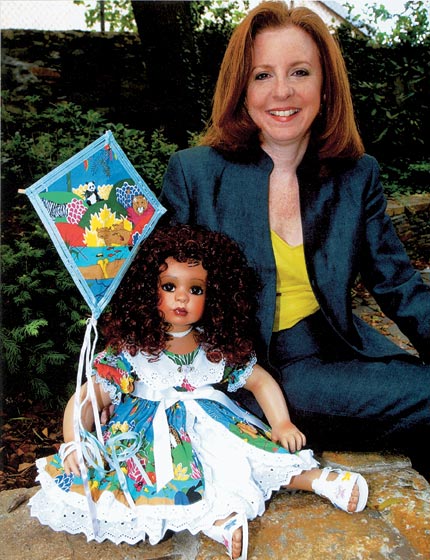Until the late 1970s, Americans almost universally regarded dolls as children’s toys. The small cadre of adult collectors that did exist focused on antique, souvenir, and international dolls.
In 1978, though, Shirley Blackall ’72, product manager in the gift division of Gorham, introduced the first high-end collectible dolls in this country. Today, artistically rendered, exquisitely dressed dolls are the most popular collectible in the United States. “At the time I was marketing Norman Rockwell figurines as collectibles to retail stores and took what I learned from that experience in design, hallmarking, numbering, and the importance of a display concept and applied that to dolls,” she says.
Blackall packed up her prototypes–dolls dancing around a maypole–and brought them to a gift show in Atlantic City. “That year we did seven times the volume in sales that we had before in imported dolls,” she says. “Customers were buying them as they were being unpacked at the stores.”
After leaving Gorham as marketing director of the gift division, she went on to found Blackall Associates Inc. in Providence, R.I., in 1985. One of her first projects was developing a line of dolls for Marie Osmond for the cable-shopping channel QVC.
Since 1998, Blackall’s Masterpiece Dolls have been featured on Home Shopping Network. Switch on the television any Wednesday at noon and you’ll find host Tina Berry surrounded by Masterpiece Dolls with amazingly life-like faces dressed as fairies, Victorian ladies, playful toddlers, or nursery rhyme characters.
Blackall has also developed gift lines and doll collections for celebrities including Maureen O’Hara, Susan Lucci, and Gloria Vanderbilt.
Lafayette Has Daily Impact
“So much of what I do each day relates to what I learned as an economics major at Lafayette and later in business school at Boston University — how to analyze the market and react to change, how to see what is missing from the marketplace and fill that void,” Blackall says. “I loved Lafayette. Being academically successful there gave me a lot of confidence. I believed I could meet any challenge and learn from every experience.”
Blackall has parlayed her education and business experience into a successful company with a group of international artists and links to factories in China. She has structured her company to minimize risk and maximize return with inventory being shipped directly to her customers.
“Selling on television is a totally different type of market,” Blackall says. “One of the most important things is how the doll looks on camera, as well as the quality of the doll when it arrives in the collector’s home. The television medium allows me to get immediate feedback and see what’s selling and why.”
Blackall also knows her customers. Many buy collectible dolls because they are reminded of their children or of a doll they had or longed for as a child. “Some of these collectors have hundreds of dolls in their collections,” she says. “They fill their homes with them. Getting someone who already has 150 dolls to buy one more is the challenge.”
Masterpiece Dolls unveils a staggering 75 new dolls every three months. Artists submit samples, with input from Blackall. Once Blackall receives a purchase order for the dolls, she oversees the transformation of the samples into finished manufactured pieces made of porcelain, resin, or wax. Customers can preview dolls to be featured in upcoming shows on the company’s web site, www.masterpiecedolls.com.
Masterpiece dolls have won a number of awards from industry publications including Doll Reader and Dolls. Last year alone Blackall Associates Inc. received 10 nominations for its dolls, including six DOTY nominations and three Dolls Awards of Excellence nominations.
Blackall traces her business instincts, in part, back to her father, who was in international business. She transferred to Lafayette as a junior in 1970, the first year women were admitted. She was one of 10 women in her class. Blackall’s husband, Frederick S. Blackall IV ’72, is an engineering graduate. “There were no women in my economics classes,” she says. “Going to a male-oriented school helped me in the business world. I learned how to be comfortable in an environment that was predominately male, and I was offered a lot of jobs when I graduated.”
Blackall’s first position was in marketing research with Philco Ford in Blue Bell, Pa. Later she moved to The Gillette Co.
“I greatly value having been at Lafayette and understand that it has played a key role in where I am today,” Blackall says. “I believe that entrepreneurs are an important part of our economy, and I’m happy I took that chance in 1985. I really have never looked back–it was a risk, but it has been well worth it.”

Shirley Blackall ’72 built her business with collectible dolls.
